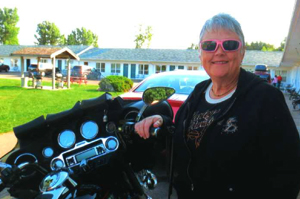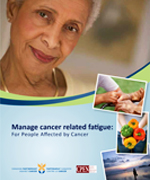New evidence-based patient resource available for cancer-related fatigue
Insights from patients key to shaping content
November 27, 2012

Mary Chaffey remembers what it was like to be hit by exhaustion.
All of a sudden you can’t even sweep up your kitchen floor. You can’t stand by the sink and wash your dishes – just normal, everyday things that you do without thinking, you take for granted… and then the wind is taken right out of your sails.”
Mary was 47, working full-time and volunteering extensively in Gander, NL, when she found the lump. That led to breast cancer surgery and four rounds of chemo followed by months of severe fatigue. Looking back – now eleven years later – she says the terrible tiredness was “probably as bad as being told that you had cancer to start with.”
“There were days I was just bedridden. Couldn’t even roll over in the bed, let alone get out of the bed hardly. There’s mental anguish that goes with that because in your mind you are thinking, “I should be able to get up and cook supper. I should be able to do the dishes.””
Widespread issue
Cancer-related fatigue is the most commonly reported symptom by people with cancer, says Tamara Harth, Canadian Chair of the Cancer Patient Education Network (CPEN). Cancer-related fatigue is more severe and longer-lasting than ordinary fatigue and may arise before, during treatment or after treatment is over.
Ms. Harth was part of a team of health professionals and researchers that collaborated with the Canadian Partnership Against Cancer and Canadian Association of Psychosocial Oncology to develop a clinical guideline on cancer-related fatigue that was published in 2011. The guideline, designed primarily for healthcare professionals, is a technical document bringing together the most current international evidence around cancer-related fatigue screening, assessment and care for adults.
 A further collaboration involving a group of patient education experts from CPEN has now generated Manage Cancer Related Fatigue: For People Affected by Cancer. The 18-page booklet, available in English and French, explains the causes of cancer-related fatigue, gives practical suggestions and offers a simple tool help track fatigue. It is based on the evidence supporting the guideline and designed to meet needs identified by people with firsthand experience.
A further collaboration involving a group of patient education experts from CPEN has now generated Manage Cancer Related Fatigue: For People Affected by Cancer. The 18-page booklet, available in English and French, explains the causes of cancer-related fatigue, gives practical suggestions and offers a simple tool help track fatigue. It is based on the evidence supporting the guideline and designed to meet needs identified by people with firsthand experience.
“We started with patients and got very clear direction on what they wanted to know. They really provided clear direction for what elements of cancer-related fatigue the tool should address,” says Harth, noting that often patients aren’t consulted until projects are well-advanced and there is less opportunity to shape the work. More than 150 patients from across the country, and with different types of cancer, were involved in the consultations.
Customizable resource
Health-care providers and other cancer groups from across the country are invited to share the booklet with patients and their families. It is available online through the cancerview.ca portal. It’s in a printable format and can also be adapted to reflect local needs, such as adding information about when patient education sessions are offered. This flexibility eliminates the need to locally create the key content, thus reducing costs and enabling current information to get more quickly into the hands of the people who need it.
There has been strong interest in the brand new publication. For example, Susan Dennehy, a clinical nurse specialist in Winnipeg says she has already found the booklet helpful for a patient concerned about her fatigue. “She was very thankful to have a resource to read, and refer to, and comforted to realize that she is not alone.”
